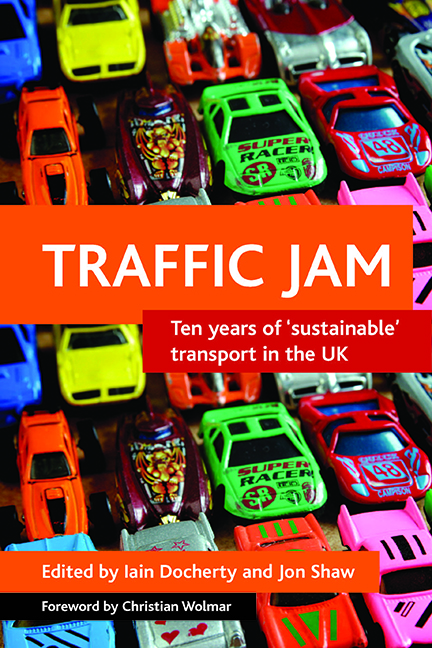Book contents
- Frontmatter
- Dedication
- Contents
- List of tables, figures and boxes
- Foreword
- Preface and acknowledgements
- List of acronyms
- Notes on contributors
- Part One Policy and politics
- Part Two Progress in policy implementation
- Part Three Ten years since A new deal for transport – signposts to the UK’s transport future?
- Index
three - Roads and traffic: from ‘predict and provide’ to ‘making best use’
Published online by Cambridge University Press: 21 January 2022
- Frontmatter
- Dedication
- Contents
- List of tables, figures and boxes
- Foreword
- Preface and acknowledgements
- List of acronyms
- Notes on contributors
- Part One Policy and politics
- Part Two Progress in policy implementation
- Part Three Ten years since A new deal for transport – signposts to the UK’s transport future?
- Index
Summary
‘Predict and provide’ can be defined as calculating how much unconstrained demand for road travel exists and adopting policy measures and providing funding streams to deliver the required capacity. As a concept, it effectively summarises government policy towards roads for much of the second half of the 20th century, but is perhaps most closely associated with the Conservatives’ White Paper Roads for prosperity (DoT, 1989) and subsequent roads expansion programme. Walton (2003) felt able to consign predict and provide to the bin of discredited policies, although he was less than complementary about what he saw as the ‘pragmatic multimodalism’ (Shaw and Walton, 2001) emerging in its place. Writing two years after the publication of Transport 2010: The 10-year plan (DETR, 2000), which specified the policy approach enshrined in A new deal for transport: Better for everyone (DETR, 1998a), Walton's position was that the Plan was sufficiently slippery to demand further detailed critique, but within a year the government had substituted the expected ‘third annual progress report’ with a new White Paper The future of transport (DfT, 2004a). This, while not officially replacing the Plan, abandoned its targets, themselves much criticised for timidity, but now nonetheless unachievable in the face of obstacles including a crisis of delivery on the railways and the introduction of only one noteworthy road-user charging scheme, in London (Chapters One, Four and Nine).
In this chapter we assess Labour's roads and traffic policies in the decade since 1998. Following a brief contextual discussion, we turn to define the principles of a ‘sustainable’ roads and traffic policy, taking into account broad sustainability objectives and the recommendations of two special policy reviews, both inspired by the Treasury rather than the Department for Transport (DfT) and published in autumn 2006: the Eddington Review on transport, productivity and competitiveness and the Stern Review on climate change (Eddington, 2006; Stern, 2006). We then consider the extent to which ministers have embraced a sustainable roads policy in practice, examining some of the key quantitative indicators and the debate and rhetoric that surround them. Such a policy emerges as much harder to construct than predict and provide, requiring much higher levels of coordination between government departments, levels of government, delivery structures and funding lines.
- Type
- Chapter
- Information
- Traffic JamTen Years of 'Sustainable' Transport in the UK, pp. 51 - 74Publisher: Bristol University PressPrint publication year: 2008



